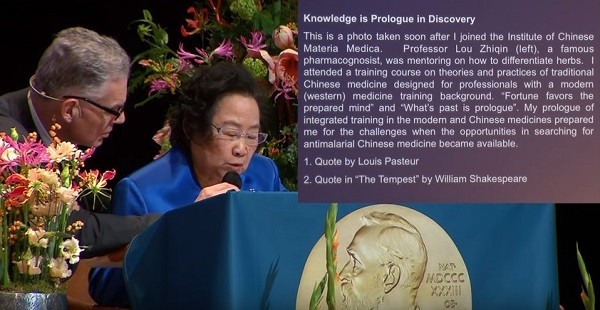“I like tranquility, tranquil as the leaves of sweet wormwood; I shun the spotlight, just as the petals of sweet wormwood do; I aspire to be upright, as are the stems of sweet wormwood.”
Imagine a chemist and a scientist in her late 80s delivering these lines brimming with poetic appeal before an international gathering of fellow intellectuals.
Or perhaps one should stop imagining because such never really happened.
Chinese pharmaceutical chemist Tu Youyou, now the country’s first-ever recipient of the prestigious Nobel Prize in Physiology or Medicine, delivered a Nobel Lecture at the Karolinska Institutet, a medical university in Stockholm, Sweden, on Dec. 7.
A supposed copy of Tu’s speech wandered off in cyberspace and a lot of netizens tagged along. The speech found and shared online, however, is fake, reported China Daily.
Most importantly, Tu didn’t actually deliver a speech; she gave a lecture.
Tu’s lecture, entitled “Artemisinin - A Gift from Traditional Chinese Medicine to the World,” never mentioned anything about tranquility, shunning the spotlight or aspiring to be upright. It rather contained statements typical of any scientific lectures: formal and technical.
Artemisia annua (sweet wormwood) contains a substance that can combat malaria.
The fake speech informs the public that when Tu bids goodbye to “artemisinin” and to her “loved ones,” she desires that her ashes be scattered “among the sweet wormwood,” reported The Wall Street Journal.
“Let me watch over the land that I have loved all my life, watch over the green leaves of the sweet wormwood, and watch over the booming development of traditional Chinese medicine,” the fake speech says.
Though naturally devoid of any fancy lines, Tu managed to inject a slight literary embellishment of sorts when she quoted a line from English poet and playwright William Shakespeare’s 16th-century play, “The Tempest.”
Born in Ningbo in Zhejiang Province in the 1930s, Tu presented her lecture in Mandarin, with the English translations flashed on the screen.
“Before I start, I would like to thank the Nobel Assembly and the Nobel Prize in Physiology or Medicine. This is not only an honor to myself but also the recognition of and motivation for all scientists in China,” said Tu.
She further said, “The story I will tell today is about the diligence and dedication of Chinese scientists during searching for antimalarial drugs from the traditional Chinese medicines forty years ago under considerably under-resourced research conditions.”
The lecture then focused on artemisinin: its discovery, chemical structure, derivatization, and receipt of global attention. Tu also shared what led to the success of the research, such as “thorough literature reviewing,” “persistency in front of challenges” and “collaborative team efforts.”
Tu likewise emphasized the important role traditional Chinese medicine played in the research.
“No doubt, traditional Chinese medicine provides a rich resource. Nevertheless, it requires our thoughtful consideration to explore and improve,” she said.
King Carl XVI Gustaf of Sweden awarded the Nobel Prize to Tu at the Stockholm Concert Hall on Dec. 10.
For those who might be wondering how the lecture ended, the octogenarian Nobel laureate treated the international audience with a glimpse of Chinese culture by concluding her talk with--surprise!--a Tang poem!
Tu read Wang Zhihuan’s (688-742 AD) “On the Stork Tower” written during the Tang Dynasty (618-907):
“On the Stork Tower
The sun beyond the mountains glows,
The Yellow River seawards flows.
You can enjoy a grander sight,
By climbing to a greater height.”



























